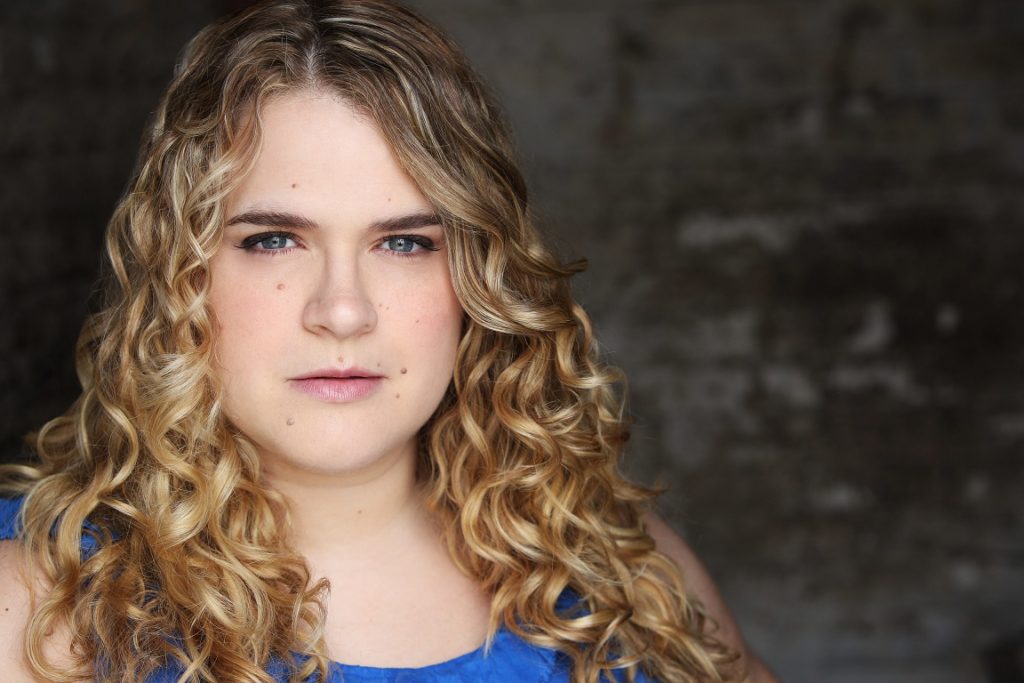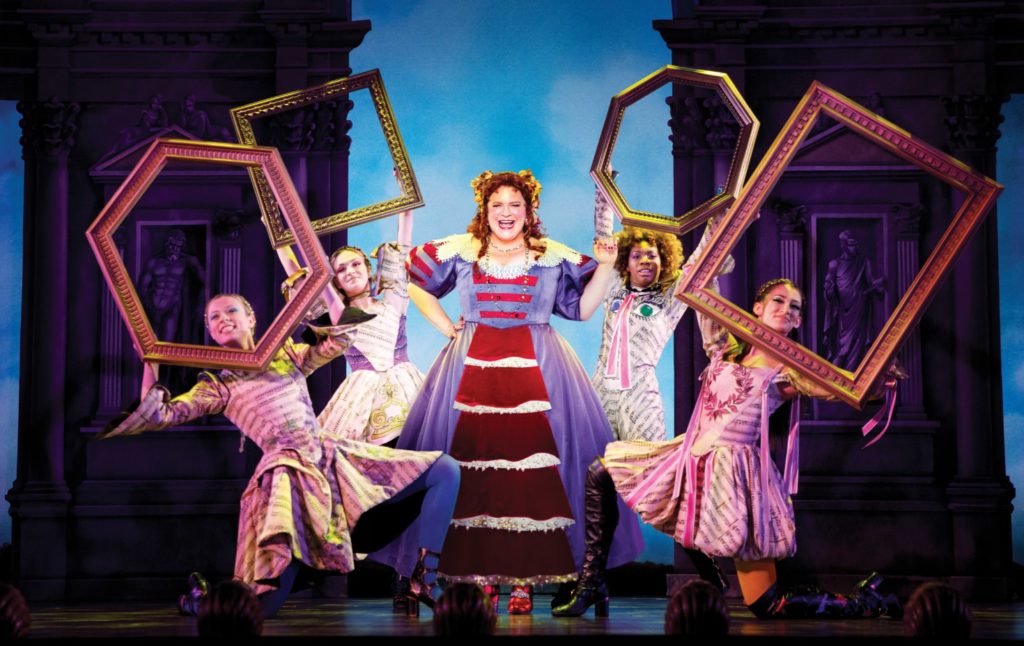In “Head Over Heels,” a new musical featuring the songs of The Go-Go’s, Bonnie Milligan is making her Broadway debut, and her reviews have been nothing short of stellar. The Hollywood Reporter said she “practically steals the show with her sardonic asides as the wisecracking [Princess] Pamela.” The New York Times wrote that Milligan “cuts loose and loud for a scenery-flinging ‘How Much More.'”
In addition to the show, Milligan has appeared on television in “Search Party” and “Happy!” She’s also acted in the U.S. tour of “Kinky Boots” and multiple Off-Broadway shows.
We talked to Milligan about her auspicious Broadway debut, what it’s like to collaborate with The Go-Go’s, and why the world was ready for a show with the powerful messages of representation and female empowerment “Head Over Heels” offers.
“Head Over Heels” is playing at the Hudson Theatre in New York.
W&H: Firstly, congratulations on your Broadway debut. You’ve been on stage and screen for a long time now, but what is it like being a woman on Broadway in 2018?
BM: It’s amazing, a dream come true. What I love about our show is that it’s a journey about women finding their voices with a very strong female power message. We have more women than men in our show, so it’s a nice journey to take eight times a week. It’s about how an ideal world can end up with more women in charge, with their voices and their strengths. It shows progress.
W&H: You’ve been involved in “Head Over Heels” since its first stage reading four years ago and now it’s a huge hit. What has the road been like to get here in terms of the creative process?
BM: It’s been a roller coaster. I’m the only original person left from the beginning, which is amazing, but it’s also a tricky, emotional journey. At the end of the day, I’m super grateful that everyone has very much respected my journey and let me express Pamela’s voice in my own way. When [director] Michael Mayer took over, he brought in [writer] James Magruder and [music supervisor] Tom Kitt. It was really exciting to watch them shape a show I’d been with for so long and turn it into a Broadway musical.
W&H: How did you first step into the role and absorb your character, Princess Pamela?
BM: At the first reading we did, the show was very different. It was not in iambic pentameter. There were different characters and different journeys. Later, when we went on to the Oregon Shakespeare Festival, the play was completely in iambic pentameter and the Festival provided vocal coaches going through the script to make sure the actors were choosing all the right stresses. Now we’re in free verse, which allows for more flexibility and jokes. All along the way, I’ve always tried to do actor-y things, like journaling about the character, or delving in scene-by-scene to see where Pamela is at emotionally because I’m such a big comedic character.
I think it’s most important to make the characters real and find their truth. If they are saying crazy things, they have to be rooted in something. As the show has gone through different fellow actors, I’ve always known where Pamela’s journey was, but I’ve been open to exploring new relationship arcs with the other actors because they always bring something new to it. The process has very much been about rooting myself in my own truth and then being open to possibilities with the new people around me.
W&H: Were you a fan of The Go-Go’s, one of the greatest female bands in history, beforehand and what has the collaboration been like with them?
BM: They were a little bit before my time but I’ve known several of their big hits from movie soundtracks like “Romy and Michele’s High School Reunion” and “Superstar.” Getting to know their catalog has been one of the greatest joys in this process. Speaking of women and strong female messages of female empowerment — they’ve been such a strong part of our process, especially over the past year. Getting to know them as people and not just the legendary rock stars they are has been unbelievable. They are so open, beautiful, and supportive.

Milligan
W&H: You’ve mentioned that “Head Over Heels” offers a great message of female empowerment and is a modern day fairytale. Can you please elaborate on that?
BM: The show starts with a king who’s very set in his ways and is very rooted in the binary and the image that men should do this, women shouldn’t do this. Then an oracle comes to town and tells him he has to change his ways. In the beginning, you see the king shut down his wife a lot when she’s talking, cutting her off, and she takes it. You also see that the princesses have a lot of suitors. Pamela has a lot of men coming to her, and she doesn’t like that but sucks it up and deals with it. The same with my sister — she can’t go after her love.
So you have these women set in their roles being told they can’t be much more. But a big journey of our show is self-discovery and finding your true self and acceptance, so along the way these women find their voices and strength. It’s a beautiful fairytale of what would happen if women could rise up and take over and create a new beat. Our show explores finding a new way, a new path.
W&H: “Head Over Heels” is all about representation. What’s it like being in a play with so much social relevance and why does the world need a show like this in 2018?
BM: So much of what’s happening in our world right now is scary with certain people’s rights and livelihoods being threatened by the current administration, and our show is a view into what an ideal world could be where we let that go. Along the way, my character realizes that she’s not attracted to men — she’s attracted to women and actually loves somebody in her life. When we come out, it’s just celebrated. There’s no trauma with it. There’s no “Can I accept myself?” or that “I can’t understand what’s happening inside of me.”
What I’ve found from meeting people at the stage door is just so powerful. We celebrate the other. We celebrate the non-binary, what makes anyone else different. Peppermint is making history as the first openly trans woman to originate a Broadway principal role [Pythio]. Her character is someone who’s non-binary. We don’t hit you over the head with it, but we state it. There are so many people at the stage door with tears in their eyes who say they never thought they’d hear a pronoun representing them, or I meet young lesbians seeing themselves fall in love on stage. It’s revolutionary. We’re celebrating so much of, again, what the administration is against. We are saying we love these things rather than trying to get rid of them.
W&H: You’re a huge proponent of positive body image in the industry. Has this role changed perceptions about body image or led to any positive progress on Broadway and beyond?
BM: I hope that the industry sees the outpouring of love for this representation in a positive way. Nothing in the script mentions my weight. This hasn’t happened before. You had “Hairspray” where they talked about her weight the whole time and there was “Escape to Margaritaville” and “It Shoulda Been You” and all these other shows that mention and talk about weight. And here you have a big girl who loves her body from the get-go.
It’s not a journey of “How do I love myself?” or “How do I get over the fact that my body isn’t perfect?” This world celebrates her! And it’s not just her. It’s everyone on stage who calls her beautiful. That’s part of the intention. When Jeff Whitty conceived the show, he wanted this role to be a plus-size actress.
You look at old paintings when women were bigger and softer. Our ideas of beauty have changed over time. Frankly, as women have gained power in their voices, all of a sudden, the “ideal beauty” has shrunk in size. I find that very interesting. We are saying that you can be beautiful in many different ways.
The number of people that don’t feel beautiful in the world because they’re told they have to be this attainable thing is heartbreaking. People can be so many different sizes, shapes, and colors. I’m so happy to represent some actual self-positivity. I hope that casting directors, directors, producers — anyone with power — recognize that [the show’s representation] is powerful. People want to see themselves on stage.
W&H: You appeared on the hit TBS show “Search Party.” Will there be more TV in store for you?
BM: I actually just shot one more episode for [the third] season of “Search Party,” and last year I shot an upcoming Showtime miniseries, “Escape at Dannemora,” directed by Ben Stiller, which premieres on November 18.







